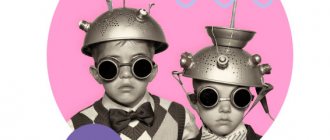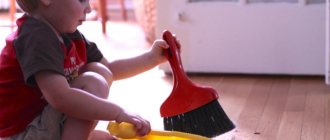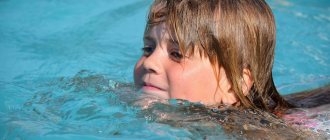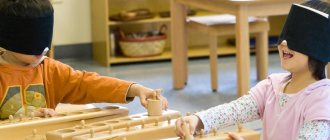The essence and methods of labor education
Definition 1
Labor education of preschool children is the process of purposefully forming in preschool children a conscious attitude and inclination to work as one of the basic needs of life, as well as the habit of working through the inclusion of children in active work.
There are a number of pedagogical methods for introducing preschoolers to work:
- development of labor activity in children of senior preschool age L.I. Saygusheva;
- the child’s entry into real labor relations M.V. Krukhlet;
- development of individuality of older preschoolers in the work of Yu.A. Michurina.
Conditions for successful educational activities
When upbringing, the order of actions, the distribution of responsibilities in the team, the appointment of those responsible, and the availability of forms for summing up are of particular importance. Practical demonstration, training in the main methods, techniques, and compliance with safety are important. It is necessary to use incentives and, if necessary, punishment and censure. Public recognition of work results and approval by adults play an important role.
?
The main condition for success is the inclusion of the child in activities that are feasible for his age and physical capabilities. If it is organized correctly, it will contribute to the formation of the necessary moral qualities: hard work, accuracy, discipline, diligence, perseverance.
Labor becomes educational under several conditions:
- It must be significant and socially useful. This is the only way to realize the significance of the work. Understanding that it brings benefits to people gives additional motivation for work activity;
- The result should be something useful, of value for the team, for oneself and for adults. If the child does not see results, there is not much benefit from the work, the desire to work may disappear;
- Work must be collective. This is the implementation of assigned tasks together, capable of uniting with a common goal. It provides an opportunity to gain experience of interaction, mutual assistance, and solidarity;
- He must be proactive, preferably creative, various forms of self-government and self-organization must be used;
- Labor must be feasible, if possible connected with educational or other educational activities, it cannot be coercion, and punishing a child with it is unacceptable;
- You need to demand not just that the assigned task be completed, but that it be completed carefully and conscientiously.
Problems of labor education in preschool educational institutions and schools
Only if these conditions are met can labor be considered a real means of shaping the personality of a new generation.
We recommend “Problems of labor education of preschool children.”
The child’s entry into real work relationships
When analyzing the above-mentioned technologies of labor education of preschool children, special attention should be paid to the technology of labor relations of M.V. Krukhlet.
Are you an expert in this subject area? We invite you to become the author of the Directory Working Conditions
The peculiarity of this pedagogical technology is associated with the process of designing the pedagogical process, which is aimed at the holistic development of the child as a subject of activity, creating the necessary conditions for the manifestation of his potential abilities and capabilities, his awareness of the importance of work as he enters the modern world, as well as the creation of labor ties with adults close to him.
The construction of a methodology based on the interrelation of means of labor education determines the steps to familiarize children with the peculiarities of the modern world in the process of various labor activities of the children themselves.
- The first step in introducing a child to work is the formation of knowledge about the work of adults: in the younger group - through observation of the activities of adults; in the middle - through familiarization with the work of preschool employees; in the older years - through getting to know the parents’ professions, their interests and hobbies at home.
- The second step is related to mastering work skills and methods of self-control and self-esteem. In the younger group - through self-service processes; in the middle - through the development of feasible processes of household labor; in the older years, you can teach children how to clean with a vacuum cleaner and a damp cloth, prepare sandwiches, etc.
- The third step involves the child entering into real work relationships with close adults. To do this, a special environment must be created in preschool groups that takes into account the age and individual gender interests and inclinations of the pupils.
SELF-CARE: Tasks and content of work in groups
1st junior group
1. To develop in children the ability to take care of themselves independently (while undressing, dressing, washing, eating).
2. Continue to teach children under the supervision of an adult, and then wash your hands yourself when they become dirty and before eating, wipe your face and hands dry with a personal towel.
3. Learn to put yourself in order with the help of an adult.
4. To develop the skill of using individual objects (handkerchief, napkin, towel, comb, pot).
5. Encourage children to be independent when eating, teach them to hold a spoon in their right hand.
6. Teach children how to dress and undress.
7. Learn to take off clothes and shoes (unfasten front buttons, Velcro fasteners) with a little help from an adult.
8. Learn to carefully fold removed clothes in a certain order.
9. Learn to put on clothes and shoes correctly.
2nd junior group
1. Continue teaching children to dress and undress independently in a certain sequence (putting on and taking off clothes, unbuttoning and fastening buttons, folding, hanging clothes, etc.).
2. Develop neatness, the ability to notice disorder in clothing and eliminate it with a little help from adults.
3. Continue to teach how to use soap correctly, carefully wash your hands, face, ears; Wipe yourself dry after washing, hang the towel back, use a comb and a handkerchief.
4. Learn to use tablespoons, teaspoons, forks, and napkins correctly.
Middle group
1. Improve the ability to dress and undress independently; teach to neatly fold and hang clothes with the help of an adult, put them in order - clean, dry
2. Cultivate the desire to always be neat and tidy.
3. Cultivate the habit of washing yourself, washing your hands before eating, when dirty, and after using the toilet.
4. Strengthen the ability to use a comb and handkerchief.
5. When coughing and sneezing, teach people to turn away and cover their nose and mouth with a tissue.
6. Continue to teach how to use cutlery correctly - spoon, fork, knife).
7. Learn to rinse your mouth after eating
Senior group
1. Form the habit of brushing your teeth and washing your face every day, and washing your hands as necessary.
2. Strengthen the ability to dress and undress independently, carefully put clothes in a closet, dry wet things in a timely manner, care for shoes (wash, wipe, clean, put away).
3. Learn to notice and independently eliminate disorder in your appearance.
4. Form the habit of taking care of personal belongings.
5. Develop a desire to help each other
6. Train yourself to brush your teeth and keep your nails clean.
7. Maintain order in your closet, put clothes in certain places
8. Learn to make your bed neatly
Preparatory group
1. Strengthen the ability to dress and undress independently in a certain sequence, correctly and neatly put clothes in the closet, put shoes in place, dry wet things in a timely manner, care for shoes (wash, wipe, clean).
2. Learn to notice and independently eliminate problems in your appearance, tactfully tell a friend about a problem in his suit or shoes, and help eliminate it. Develop qualities such as responsiveness and mutual assistance.
3. Learn to independently prepare materials and manuals for the lesson
4. Get into the habit of brushing your teeth, rinsing your mouth after eating, and washing your feet before going to bed.
By the end of the year, children can: dress and undress, keep their clothes in order, and, if necessary, put them in order.
ON A NOTE. Educational toys for kindergarten at low prices from a specialized store for teachers “Kindergarten” - detsad-shop.ru
ALGORITHMS OF SELF-CARE SKILLS BY GROUPS
Guidelines
The formation of self-service labor skills is closely interconnected with the formation of cultural and hygienic skills and affects their improvement. The algorithm will help the teacher in working on a long-term plan, in thinking through the sequence and choosing specific forms and methods of work for a more complete and timely formation of all self-service labor skills in children of each age group.
ON A NOTE. Didactic games for kindergarten at low prices from a specialized store for teachers “Kindergarten” - detsad-shop.ru
HOUSEHOLD WORK: Tasks and content of work in groups
1st junior group
1. Teach children to maintain order in the playroom and, at the end of the games, to place the play material in its place.
2. Involve children in performing simple labor activities. Together with an adult and under his supervision, place bread bins (without bread) and napkin holders on the table before eating.
2nd junior group
1. Encourage children to independently carry out basic tasks - prepare materials for classes (brushes, modeling boards, etc.); After playing, put away toys and building materials
2. Teach to maintain order and cleanliness in the premises and area of the kindergarten
3. Encourage to provide assistance to adults, to cultivate a caring attitude towards the results of their work.
4. In the second half of the year, begin to develop in children the skills necessary for serving in the dining room: helping to set the table for dinner (laying out spoons and forks, arranging bread bins, plates, cups, etc.).
Middle group
1. Teach children to maintain order in the group and in the kindergarten area: put away building materials, help the teacher, glue books and boxes.
2. Teach children to independently perform the duties of a canteen attendant: carefully arrange bread bins, lay out cutlery (spoons, forks, knives).
Senior group
1. Teach children to help adults maintain order in the group: wipe toys and teaching aids, wash toys and building materials, repair books and toys.
2. To develop the ability to clean up the kindergarten area: sweep and clear paths of debris, snow in winter, water sand in the sandbox
3. Teach children to independently and conscientiously perform the duties of the dining room attendants, to set the table, to clear away the dishes after meals.
4. Learn to independently lay out materials for classes prepared by the teacher, put them away, wash brushes, paint sockets, palettes, wipe tables
Preparatory group
1. Continue to teach children to constantly and promptly maintain order in the group and on the site: wipe toys and aids, wash toys, building materials, repair books and toys together with the teacher.
2. Continue to teach how to independently clean up the kindergarten area: sweep and clear paths of debris, snow in winter, water sand in the sandbox.
3. Learn to make your own bed after sleep
4. Accustom children to independently and conscientiously perform the duties of dining room attendants: setting the table in full, distributing second and third (berries, fruits) courses, clearing away dishes after meals, sweeping the floor
5. Learn to independently lay out materials for classes prepared by the teacher, put them away, wash brushes, paint sockets, and wipe tables.
By the end of the year, children can: organize their workspace and put it in order after classes are over.
Guidelines
The work of developing household skills in children is interconnected with the formation of the child’s general culture: setting the table correctly, cleaning the table, maintaining cleanliness and order in the room and area. Mastering labor and household operations makes a child independent and ready for adult life.
ON A NOTE. Role-playing costumes for kindergarten at low prices from the specialized store for teachers “Kindergarten” - detsad-shop.ru




